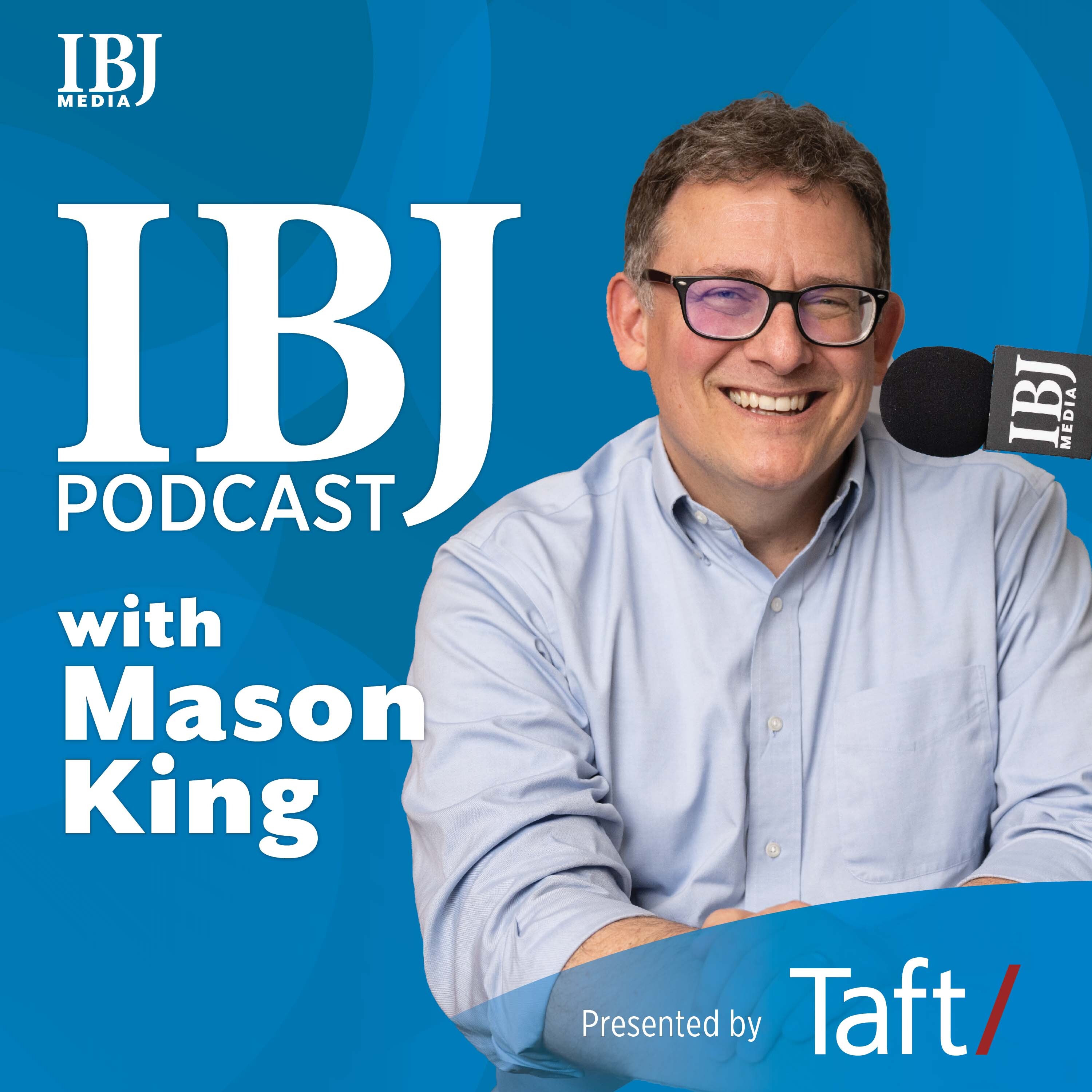Episodes
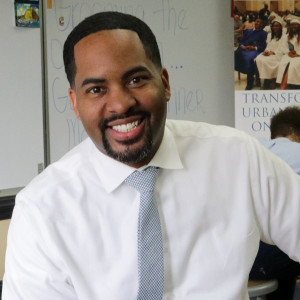
Monday Sep 30, 2019
This vice principal's 'barber shop' helps turn boys into men
Monday Sep 30, 2019
Monday Sep 30, 2019
Fred Yeakey learned early in his teaching career that one way to have in-depth conversations with his students was to cut their hair. Something about the give-and-take that occurs during that interaction allowed kids to open up in ways he hadn't seen before.
And so was born Mr. Yeakey's barber shop—a program the educator has taken with him as he's changed schools.
Today, at Providence Cristo Rey High School, where Yeakey is vice principal of culture and mission, a handful of students gather weekly after school. Some get their hair cut. Others are just there for the conversation about sports, school, trauma, jobs and life.
Mr. Yeakey talks with host Mason King about why the barber shop works, what he's learned from his students and how the program could be used at other schools.

Sunday Sep 22, 2019
This AI whiz chose Indy over Silicon Valley. He explains why.
Sunday Sep 22, 2019
Sunday Sep 22, 2019
Luke Zhang had offers from the biggest tech firms in the country when he graduated with three degrees—in computer science, software engineering and mathematics—from Rose-Hulman Institute of Technology.
But Zhang chose to take a job instead with DemandJump in Indianapolis, a move he attributes to the people he met during a TechPoint internship program and the desire to be in a place where he could make a difference.
Zhang, who came to the U.S. from China as a teenager, talks with podcast host Mason King about what makes the Indy tech community special and how it could market itself better. And he explains why he takes people skills as seriously as he does his math skills.
To read more about Zhang, check out this story by IBJ reporter Anthony Schoettle, who talked to Zhang's colleagues, including his boss at DemandJump who called Zhang a "generational talent."
IBJ photo/Eric Learned
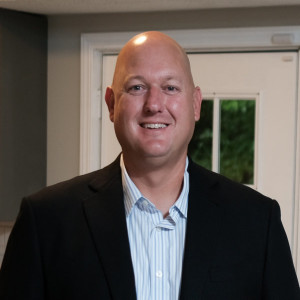
Monday Sep 16, 2019
How a former cop came to lead the area's top-selling real estate team
Monday Sep 16, 2019
Monday Sep 16, 2019
Dennis Nottingham was on a police run when he met a house flipper who piqued his interest in real estate. Not long after, Nottingham took some classes and got his real estate license. And for awhile, he sold houses on the side, while working the night shift for the Indianapolis Metropolitan Police Department.
But after his daughter was born, Nottingham knew something had to give. So he moved into real estate full time, with a focus on selling foreclosures and homes in need of major rehab.
Today, he owns a RE/MAX franchise — the Indy Home Pros Team — which has taken the No. 1 spot on IBJ’s All-Star team rankings for the fourth straight year. The team had sales volume of $316 million in 2017-2018 on 1,957 transactions.
Nottingham talks with podcast host Mason King about why he's assembled such a big team and why they focus on moderately priced homes, unlike most of the other teams on the IBJ list. And he explains how his police work helped him be a better real estate agent.
Click here to see the full list of real estate teams on IBJ's list and find out who made the list of top-selling solo agents.
IBJ photo/Eric Learned
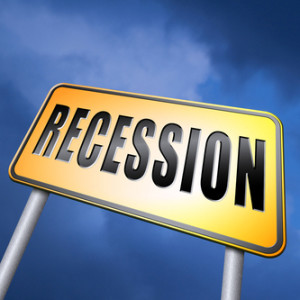
Sunday Sep 08, 2019
How to prepare for the next recession
Sunday Sep 08, 2019
Sunday Sep 08, 2019
History tells us that a recession is all but inevitable. But just when the next slowdown will strike is a mystery.
So is there something you should do now to prepare? IBJ columnist Peter Dunn—aka Pete the Planner—says yes. But unless you're within 10 years of retirement, resist making big changes to your investments.
Pete talks to host Mason King about how to look at your budget and evaluate your readiness for a recession, and he offers advice about the kinds of changes that can help. Plus, he explains why you're making a mistake if you try to time the market's ups and downs.
Photo courtesy of Shutterstock.com
This episode of the IBJ Podcast is sponsored by Krieg DeVault.

Monday Sep 02, 2019
Upland expands Indiana footprint as it sends beer overseas
Monday Sep 02, 2019
Monday Sep 02, 2019
Upland Brewing Co. opened its main brewery and first brewpub in Bloomington in 1998 and this year will produce 16,000 barrels of beer a year, making it the state's third-largest brewer.
It now operates two brewpubs in Indianapolis and one each in Carmel, Columbus and Bloomington, as well as tasting facilities at its two Bloomington breweries.
Host Mason King talks with Pete Batule, Upland’s chief operating officer, about the company's growth, including its busy new brewpub in Fountain Square, and the line of sour beers that its selling across the country and overseas.
For more info, read IBJ reporter Susan Orr's story about Upland in the most recent issue of IBJ.
This episode of the IBJ Podcast is sponsored by Krieg DeVault.
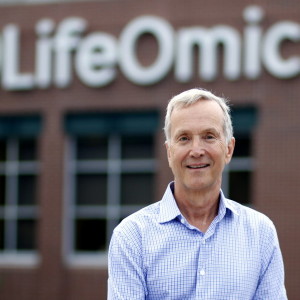
Monday Aug 26, 2019
Don Brown's newest venture combines his two passions: health and technology
Monday Aug 26, 2019
Monday Aug 26, 2019
Don Brown is best known in Indy tech circles for launching and selling high-profile tech companies, including Software Artistry, which he sold to IBM for $200 million, and Interactive Intelligence, which sold to Genesys for $1.4 billion.
What many don't know is that he's also a doctor. That's right, Brown has a medical degree from Indiana University and and a master’s in biotechnology from Johns Hopkins University. (He earned the former while simultaneously earning a master's of computer science and the latter just a few years ago while running Interactive Intelligence.)
Today, he's running a company that combines his health and technology passions—LifeOmic, which operates a cloud system for precision health data.
Host Mason King talks with Brown about he has juggled all of that work (he also has eight kids) and how is interest in intermittent fasting has led LifeOmic down a new path.
To learn more about LifeOmic's new consumer app, read John Russell's story in this week's IBJ.
This episode of the IBJ Podcast is sponsored by Krieg DeVault.
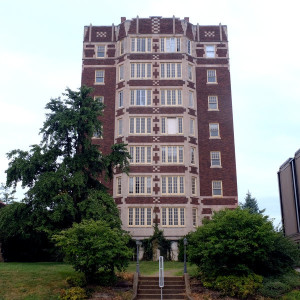
Sunday Aug 18, 2019
Is the historic Drake building worth saving?
Sunday Aug 18, 2019
Sunday Aug 18, 2019
The Children’s Museum of Indianapolis last month announced it planned to demolish the Drake, a nearby, 91-year-old apartment building it owns, with the goal of using the space—at least for now—for additional parking.
But historic preservationists want to save the building, and urbanists say the region needs more affordable housing, especially given that the Drake sits near a stop for the soon-to-open Red Line rapid transit route.
IBJ reporter Hayleigh Colombo talks about the controversy—the possibilities for the building—with podcast host Mason King. They explore whether moving the building is an option, whether Indianapolis Historic Preservation Commission might step in and what the role the city could play in the process.
To read more, check out Colombo's story here.
This episode of the IBJ Podcast is sponsored by Krieg DeVault.

Monday Aug 12, 2019
How Indy will use tax incentives to combat low wages
Monday Aug 12, 2019
Monday Aug 12, 2019
Soon companies will need to pay at least $18 an hour and offer other benefits—like health insurance or help with child care, transit or other worker needs—to be eligible for tax incentives and training grants from the city of Indianapolis.
The change is part of an effort by the city and Indy Chamber to combat poverty and help move more lower-income residents into the middle class.
Host Mason King talks with Ian Nicolini, vice president of Develop Indy, the city's economic development agency, about the new policies, which will take effect Jan. 1.
To learn more, read reporter Hayleigh Colombo's story detailing the policy.
This episode of the IBJ Podcast is sponsored by Krieg DeVault.
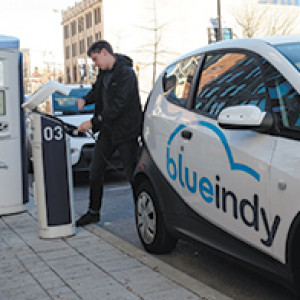
Sunday Aug 04, 2019
Profitability for Blue Indy still 'a few years away'
Sunday Aug 04, 2019
Sunday Aug 04, 2019
The Blue Indy electric-car-sharing service launched in Indianapolis in 2015. It had its detractors, but you couldn’t fault the service’s backers for being timid.
Basing Blue Indy on a service that had tens of thousands of subscribers in Paris, they predicted that by 2020 the company would be profitable and have at least 15,000 members, 200 charging stations, and 500 electric cars on the road.
Wholeheartedly supported by the Ballard administration, Blue Indy carved out curb-side stations for its vehicles in some of the city’s busiest areas. The city of Indianapolis invested $6 million to help get it off the ground, with a profit-sharing plan that would kick in once the company was profitable and its own considerable investment was recouped.
That won’t be in 2020, or at any time soon. While Blue Indy has grown significantly since its inception and its numbers are on the upswing, it’s still not close to the results it initially projected.
In this week’s edition of The IBJ Podcast, Blue Indy’s local market chief admits that the original predictions for Indianapolis were too optimistic, being based on the performance in Paris. It won’t be in the black next year, and profitability “is going to be a few years away,” he said.
“The mobility industry is a tough industry to make money at, and it really is a long-term project to offer members the different services they want, the locations they want and the use cases they want,” said James Delgado, managing director for Blue Indy.
This episode of the IBJ Podcast is sponsored by Krieg DeVault.

Sunday Jul 28, 2019
Sunday Jul 28, 2019
This isn’t your just father’s weekend retreat or mother’s opportunity to binge on bridge. Not anymore.
Country clubs across the nation are in the midst of a transformation as the latest generation of breadwinners decide how they want to spend their leisure time and disposable incomes.
As the conventional wisdom goes, millennials are fiercely independent, burdened by college debt and skeptical of traditional institutions. But research by the golf and country cub industry indicates that some in the demographic are looking for a local place to get away with their children for secluded family time, as well as the traditional advantages of forging career and social connections.
To attract millennials, clubs in the Indianapolis area are updating their facilities, beefing up their recreational offerings for kids, adding activities that would appeal to young adults and adjusting the way they charge for memberships. They’re also trying to air out any remaining whiffs of snob appeal, so delightfully skewered by the classic film comedy “Caddyshack.”
In the latest edition of The IBJ Podcast, host Mason King gets the lowdown from reporter Samm Quinn on how central Indiana’s clubs are changing, while they get the national perspective from Jeff Morgan, CEO of the Club Management Association of America.
This episode of the IBJ Podcast is sponsored by Krieg DeVault.

